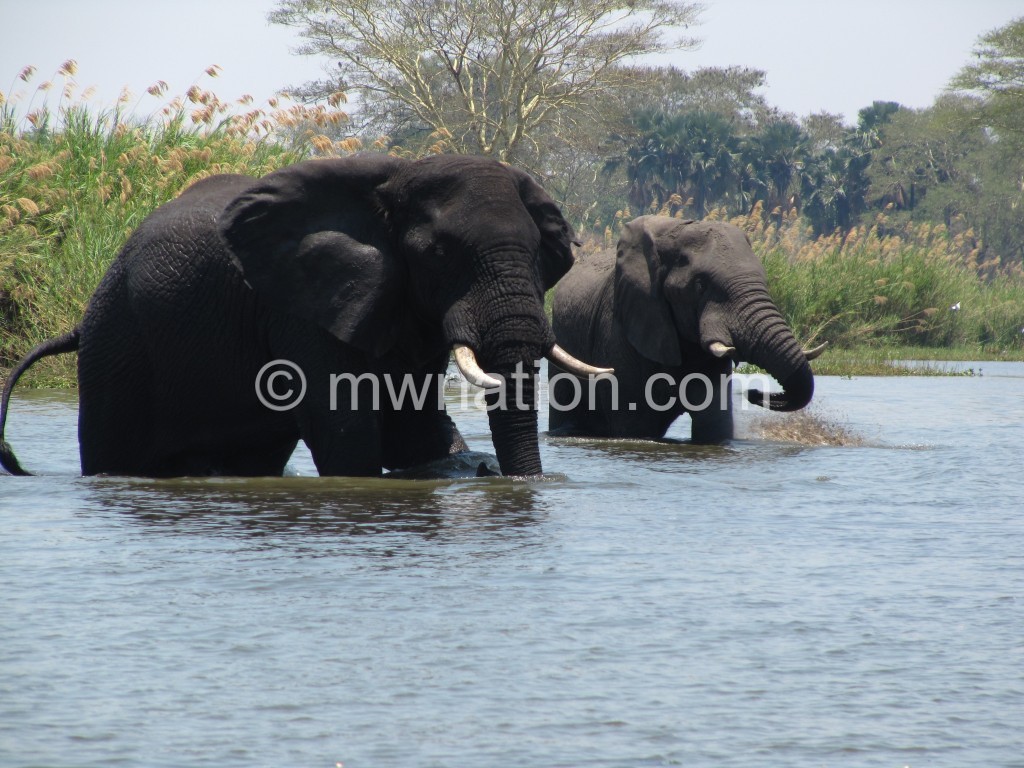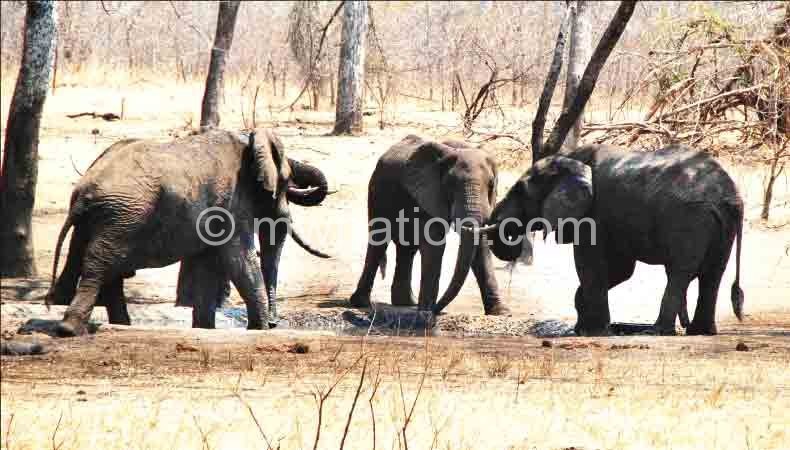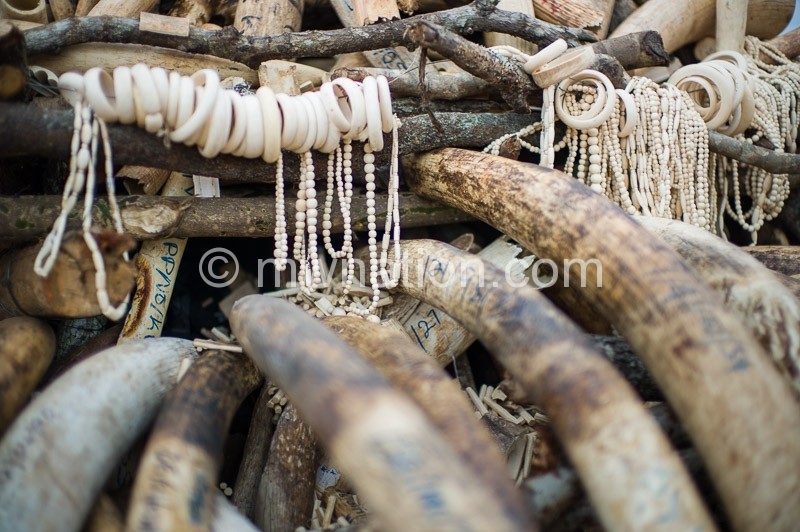Ivory is worthless, our elephants are invaluable

By Clement Manjaalera**
The decision to postpone the ivory burn caused heated debate last week, with the vast majority of commentators missing the point by a wide margin. As social media and online chat forums were set alight with calls to cash in on the apparent ‘millions’ that Malawi could make from selling its ivory, it was blatantly clear that most people failed to grasp the overarching issue. Quite simply, the ivory in question is worth absolutely nothing to Malawi. To be sold it would have to be laundered illegally and international law broken.

The implications of selling our ivory are far reaching and extremely damaging to both our economy and conservation efforts. Crucially, Malawians openly talking about selling their ivory to raise cash is circumventing international law, serve only to reinforce Malawi’s reputation of corruption in the light of the Cashgate scandal. Selling this confiscated illegal ivory is no different to taking a haul of confiscated cocaine and deciding not to destroy it but to sell it back into the black market. Note that one cannot liken this either to the destruction or sale of impounded vehicles, as was the view of some of this weekend’s uninformed pundits. Vehicles in themselves are not illegal and do not in any way represent the evils of either cocaine or the illegal ivory trade.
In any event, the Government should not benefit from the confiscation of materials from illegal activities. This would otherwise not only create a perverse stimuli for confiscating but more concerning creates demand from Government for the illegal activities. The principle is very clear. As Government you state that something is illegal, you cannot for no reason whatsoever benefit from enforcing the illegal activity other than benefits that are the reason for declaring the illegality of the activity.
Second, any sale, legal or illegal, suggests Malawi supports the notion that ivory has an economic use and that elephants are a commodity that can be harvested for their tusks. Not only would this de-value wildlife in relation to its importance to tourism and thus its contribution to the economy, but also goes against three of the international declarations signed by Malawi in the past year****, which commit to a hard line against the ivory trade, thus undermining international collaboration and conservation efforts.


Keeping ivory in storage represents a major security risk, as there are criminals and corrupt people who do not respect the law and will target the stockpiles for their own ends. The cost of securing the stockpile against theft is a significant burden to the Government. If all or some of the ivory is stolen or goes “missing” then Malawi’s reputation will be irretrievably tarnished, as the amount of ivory has been independently audited and the world knows exactly what is held in those stockpiles down to the last kilogram.
Knowing the impact that ivory trade can have, we should surely want no part. The fight against wildlife crime and the ivory trade requires transnational cooperation and collaboration, in terms of intelligence sharing as well as financial and technical support. This is key to supporting the rangers, our front line law enforcement who are risking their lives on the ground. Would the international wildlife community continue to step in with support for a country that values ivory more than its elephants, that fuels a trade which will undoubtedly lead to the extinction of Africa’s most majestic species?
This is no time for half measures. Beyond the sensationalist headlines there is a wildlife crisis that needs our full attention now before it is too late. A staggering 25,000 of these elephants are estimated to be killed every year for their ivory tusks. If current rates of poaching continue they are set to be extinct in just ten years’ time, already a reality in countries like Sierra Leone and Senegal*. Exact data for Malawi is scarce but one source estimates that 71% of Malawi’s elephants were lost between 2002 and 2006**. In its heyday Kasungu National Park was teeming with so much wildlife that stock was sent to South Africa’s famous Kruger NP. Now that 2000 strong elephant population of the 1980’s is down to an estimated 58***. Malawi’s elephant numbers may be smaller than that of its neighbours, at around 1500, but these are still viable populations and the country is vulnerable to exploitation, as a target by traffickers coming from the surrounding countries of Zambia, Tanzania and Mozambique. Wildlife crime robs Malawi of its natural capital and cultural heritage, undermining the livelihoods of natural resource dependent communities (which includes many of the 16.5 million citizens), damaging the health of the ecosystems we depend on and undermining sustainable economic development such as tourism.
One study by the David Sheldrick Wildlife Trust recently put a price on a single elephant’s head in terms of its value to tourism – over $ 1.6 million, which makes every elephant alive worth over 76 times more than the value of its ivory once it is dead. A single living elephant drives tens of thousands of dollars in tourism-related revenues along a whole chain of people from the lodge waiter and local rural tradesmen through to the car rental companies and the aviation industry. Given the overlap of ivory poaching locations and elephant tourism operations, every elephant killed makes these regions much less profitable. Alive, elephants benefit local communities and economies. Dead, they benefit criminal and even terrorist groups.
This analysis did not take into account the value of elephants to biodiversity, a topic for another day but suffice to say that the impact of biodiversity loss on factors such as agriculture and human health will be catastrophic. When biodiversity is lost, ecosystems break down and the world’s poorest often bear the brunt of the fallout. 75% of the world’s poor live in rural areas, and rely on healthy ecosystems for food, shelter and livelihoods, and this includes many of Malawi’s own 16.5 million people. Half of the world’s wildlife species have been lost in the last 40 years through human activity, and if we do not prioritise the protection of our natural heritage now then it may soon be too late. So there are no relevant arguments to be had where wildlife is being prioritised over wildlife – the survival and wellbeing of both are intrinsically linked.
On a positive note, last Thursday’s commemorations were vibrant and colourful, representing a peak in Malawi’s ‘stop wildlife crime’ campaign. The joint initiative, run by Department of National Parks & Wildlife and Lilongwe Wildlife Trust, has been running for over a year now and has certainly helped to push wildlife issues up the agenda. Crowds walked to Parliament where they were met by the President himself who in turn accepted over 7000 signatures supporting the Government in their decision to say ‘no’ to ivory. His Excellency then viewed the ivory stockpile and unveiled a plaque, perched on a hill that overlooked Parliament and Lilongwe as he was cheered on by well over a thousand onlookers. The speeches that followed, and the State House press call that evening, reflected a hard stance against wildlife crime and a clear understanding of the urgency of the crisis.
With ignorance no longer an excuse, there are many in Malawi who are taking the fight against wildlife crime very seriously and the results are beginning to show. In just one year, there have been stiffer sentences, better inter-agency cooperation and the reviewing of wildlife acts. The elephant crisis has now surpassed its tipping point and attitudes worldwide must change now in order to save the elephant, coupled with swift and strong action. Let’s hope theirs are the voices of reason that are heard in the coming months, that Malawi can step up to this enormous challenge and support the biggest stand possible against the ivory trade.
———————————————————————
**Clement Manjaalera, is the spokesman, Lilongwe Wildlife Trust
——————————-
References:
* Dead or Alive (Iworry, David Sheldrick Wildlife Trust)
** Blanc, J.J., Barnes, R.F.W., Craig, G.C., Dublin, H.T., Thouless, C.R., Douglas-Hamilton, I., & Hart, J.A. (2007). African elephant status report 2007: An update from the African Elephant Database. Occasional paper of the IUCN Species Survival Commission No. 33. IUCN/SSC African Elephant Specialist Group. IUCN, Gland, Switzerland. vi+276 pp.
*** www.elephantdatabase.org
**** London Declaration on Illegal Wildlife Trade (2014), Elephant Protection Initiative (2015), Kasane Statement on Illegal Wildlife Trade (2015)





Thanks Clement for such a well thought of and evidence based argument on the issue. However , my question still is, what will happen to the Ivory now. do conservationists like yourself take pride in the destruction of tusks whose elephants have already died or maybe we can invest in in something legal that can be made out of those tasks? I don’t know but i like the articulation of issues in your article
Well written. But some of the facts quoted in the article may not apply to the Malawi case. For instance, if you claim we have 1,500 elephants, and each racking up $1.6M presumably in a lifetime (or is it annually?), then everything else being equal we are talking of a cool $2.4B. The corrupt APM surely would love that!!